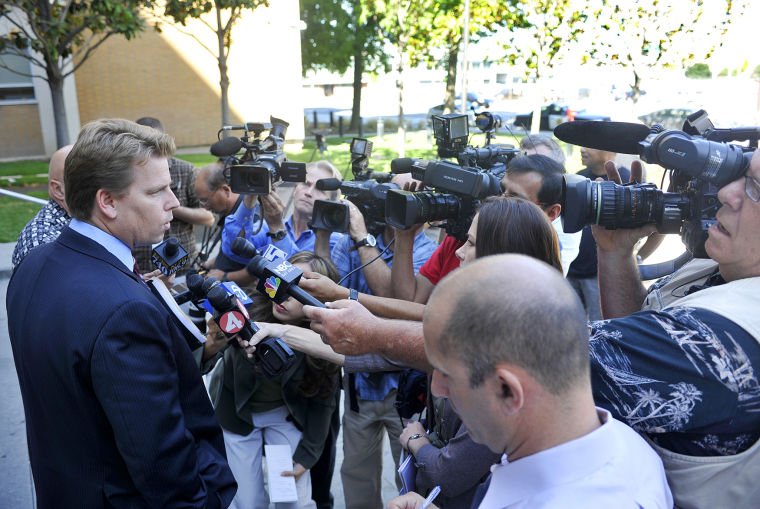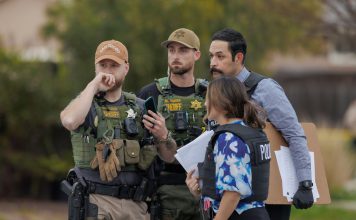
GILROY—A federal appeals court ruled this week that a Santa Clara County judge made “egregious misstatements” while arguing the people’s case as prosecuting deputy district attorney in the 2001 murder of a man in Gilroy.
On Tuesday, the Ninth U.S. Circuit Court of Appeals unanimously declared prosecutor-turned-county judge Stuart Scott made, in closing rebuttal arguments to the jury, “falsified, inflammatory and ethnically charged remarks” that ultimately led to the murder conviction of Paul Zapata for the shooting of Juan Trigueros, 24 of Soledad, at a 7-Eleven. Trigueros, a Mexican national, was shot twice at point-blank range at the convenience store near the intersection of Leavesley Road and Murray Avenue.
He stumbled into the 7-Eleven and asked for help before collapsing and dying on the store’s floor, according to prior Dispatch reports.
As part of the Ninth Circuit Court’s 37-page ruling, Zapata’s murder conviction was overturned in part because Scott “fabricated…ethnically charged epithets delivered in the moments before the jury was sent to deliberate Zapata’s case.”
But it didn’t take long—just over two hours—for a jury of nine women and three men to determine in November 2004 that Zapata, then 23, was guilty of first-degree murder in the shooting three years prior, following Scott’s closing arguments.
In addition to the murder charge, Zapata was convicted of committing a crime to benefit a criminal street gang and using a firearm causing death at the conclusion of the four-week trial, according to past reports in this newspaper.
But the appeals court—comprised of three judges—ruled in a written decision that Scott “wove out of whole cloth, with no evidentiary support, a fictional and highly emotional account of the last words (Trigueros) heard Zapata shout as Zapata supposedly shot him.”
Zapata argued to the Ninth Circuit Court Scott’s comments constituted prosecutorial misconduct, the ruling states.
Police told the Dispatch in 2003 that Trigueros and Zapata never met and that the only motive for the slaying was Trigueros looked like a Mexican national. Scott and investigators said Zapata was a member of the Norteño street gang.
At the time of his death, Trigueros was a student at a Gilroy nonprofit vocational training center for low-income students and had no ties to any gangs, according to police reports.
But Scott said Zapata killed the 24-year-old man because he happened to be wearing a Kobe Bryant jersey. The bluish color of the jersey “set off” Zapata because it represented the colors of his rival gang, then-deputy district attorney told this newspaper.
“They were in that location, they see Juan Trigueros and presume him to be an Eighth Street Sureño on their turf, and they execute him,” Scott said.
Investigators said the break in the case came in the form of anonymous tips from people who provided information about where the getaway vehicle was.
Witnesses told police they saw Zapata driving southbound on Murray Avenue after the shooting before getting into a 1989 white Toyota pickup truck. Police later discovered the Toyota in a Morgan Hill garage and happened to be registered to Zapata’s grandmother, according to past reports in this newspaper.
Around the time of his conviction, police said Zapata had a “long criminal history.” He had most recently done time in San Quentin State Prison for the conviction of a November 2003 felony assault and burglary in Gilroy.
But the appeals court ruled that Scott, in his statements to the jury during closing arguments, “blurred the distinction between Zapata’s past convictions and the crime for which he was standing trial,” the written ruling states.
The three-judge panel said Scott wove together an inaccurate story detailing the final moments of Trigueros’ life, telling the jury Zapata made several “despicable, inflammatory ethnic slurs” to the victim as he bled out, including “you (expletive) wetback.”
Zapata’s conviction of first-degree murder was also reversed on the grounds his defense attorney, then a public defender and now retired, John Vaughn, failed to make objections to Scott’s closing argument.
However, Vaughn argued that the prosecution had not been able to conclusively link Zapata to the scene of the crime “either through positive witness identification or physical evidence and emphasized bias and credibility problems with several of the prosecution’s witnesses,” the ruling reads.
In January 2009, the California Court of Appeal upheld Zapata’s conviction for murder and the California Supreme Court denied further review, according to the Ninth Circuit decision.
What’s next for Zapata, Scott?
Despite the Ninth Circuit Court’s reversal of Zapata’s conviction, he will not be released from custody anytime soon, pending a decision whether the District Attorney’s Office files an appeal to the ruling.
“We are studying the court’s decision and will review the case file to determine the next step,” Assistant District Attorney Scott Tsui told the Dispatch Thursday.
Whether Scott will be punished in any way following the court’s ruling remains unclear—but its not in the District Attorney’s Office’s purview to make that decision, a spokesperson said.
“Scott is now a judge. We don’t discipline or have any authoritative power over judges,” spokesman Sean Webby said in an email to this newspaper.













“Judge” Stuart Scott has proven to be as ethically-challenged as prosecutor Stuart Scott was. Only worse. This video captures Santa Clara County Sheriff’s Department deputies hunting down and harassing a local resident who criticized “Judge” Scott in court. Must be seen to be appreciated: https://youtu.be/weS-rIJGpsQ